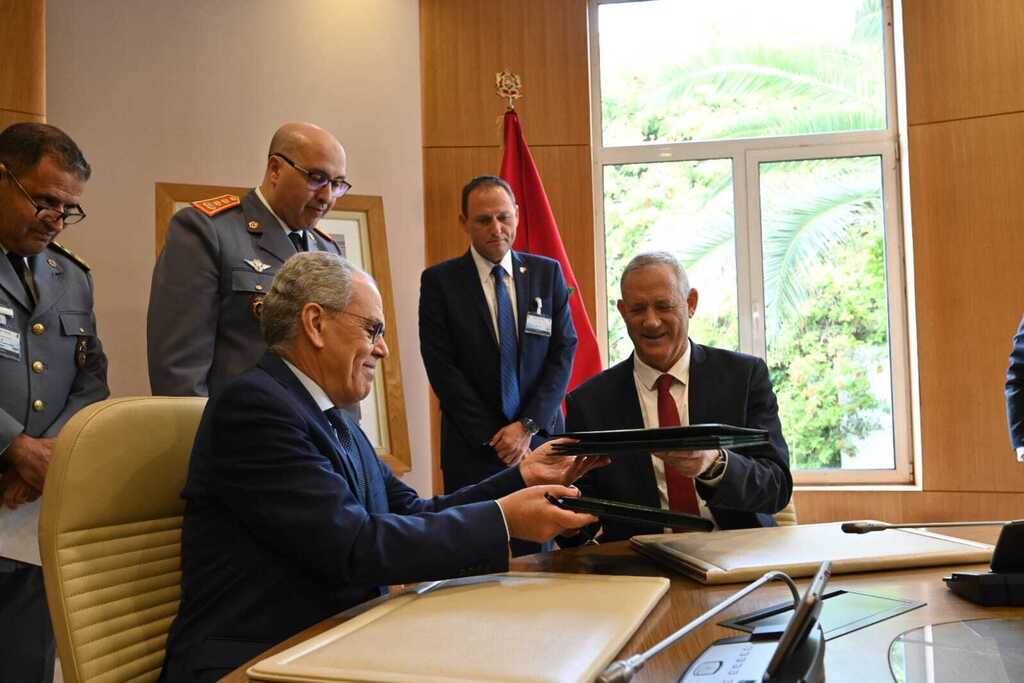
by Neville Teller
When Benny Gantz made the first formal visit by an Israeli defense minister to Morocco on November 24, he landed in the midst of a political maelstrom.
The Morocco-Israel normalization deal announced by US President Donald Trump on December 10, 2020, was not without its cost. The price the US paid to secure Morocco’s signature under the Abraham Accords was to recognize Morocco’s claim to Western Sahara. In doing so America agreed to defy the UN, the African Union, and most world opinion, which holds that Western Sahara’s future should be settled by a UN-supervised referendum of the Sahrawi people. Morocco’s neighbor, Algeria, felt particularly aggrieved. Algeria has long supported the Sahrawis of Western Sahara who, backed by their militant body the Polisario Front, are seeking independence from Moroccan rule.
Will you offer us a hand? Every gift, regardless of size, fuels our future.
Your critical contribution enables us to maintain our independence from shareholders or wealthy owners, allowing us to keep up reporting without bias. It means we can continue to make Jewish Business News available to everyone.
You can support us for as little as $1 via PayPal at office@jewishbusinessnews.com.
Thank you.
After the normalization deal relations between Algeria and Morocco, uncertain for decades, deteriorated badly. Since mid-2021 the two countries have severed diplomatic relations, recalled their ambassadors, closed their borders, and blocked their airspaces. Then on November 1, Algeria ended the contract which delivers gas to Spain by way of a pipeline that runs through Morocco and had guaranteed it 10 percent of its gas supply. That will now be lost.
Algeria’s president, Abdelmadjid Tebboune, issued a statement confirming that he had ordered the contract not to be renewed “in light of the hostile behavior of [Morocco] which undermines national unity.” Spain will continue to receive its gas from Algeria by way of a second smaller pipeline augmented by liquified natural gas imported by sea.
On the very day the gas contract ended, the difficult situation between Morocco and Algeria deteriorated still further. Three Algerian truck drivers traveling on a desert highway through the Polisario-held area of Western Sahara were killed by a drone strike.
“Several factors,” ran an official Algerian statement, “indicate that the Moroccan occupation forces in Western Sahara carried out this cowardly assassination with a sophisticated weapon. The killings will not go unpunished.”
Morocco denies carrying out the attack, although it is in possession of combat drones. According to the Royal Moroccan Armed Services website, Morocco took delivery of Turkish-made Bayraktar drones in September 2020.
This was the chaotic situation that greeted Gantz as he landed in Morocco. However, the furor was not permitted to disrupt the purpose of his visit. On November 24 Israel and Morocco signed a landmark memorandum of understanding that lays the foundation for security cooperation, intelligence sharing, and sales of military hardware.
Later Gantz said that the agreement was “very significant and will allow us to exchange ideas, enter joint projects and enable Israeli military exports here.”
When Salah Goudjil, president of the Algerian senate, learned of the new security agreement, which will make it easier for Morocco to acquire hi-tech exports from Israel and allow future arms deals worth hundreds of millions of dollars, he claimed that Gantz’s visit had “targeted” Algeria, and that Algeria’s enemies were intent on undermining the nation.
The antagonism between Morocco and Algeria centers on the past, present and future of Western Sahara, a large chunk of territory appended to the south of Morocco, with a 700-mile long Atlantic coastline. It was once a Spanish colony. In 1966 the UN General Assembly asked Spain to hold a referendum of the Sahrawi population on the issue of self-determination. Instead, in 1975 Spain relinquished control of the region to a joint Moroccan-Mauritanian administration. By then, though, a flourishing Sahrawi nationalist movement called the Polisario Front had sprung into existence. Declaring the region to be a Sahrawi Arab Democratic Republic (SADR), the Polisario launched armed resistance to the new regime. Four years of combat were enough for Mauritania, which withdrew its claims on the territory, leaving Morocco in de facto control.
What followed was a further twelve years of fighting between Morocco and the Polisario. In 1991, a UN-brokered truce ended the conflict. As part of the deal, Morocco promised to hold a referendum on independence. This has not yet taken place. Meanwhile, the UN, maintaining that the Sahrawis have a right to self-determination, considers the Polisario Front to be the legitimate representative of the Sahrawi people. The African Union regards Western Sahara as an independent state. In short, until the Trump deal, Morocco stood alone in its claim on Western Sahara. Now it is supported by both the US and Israel.
According to a statement from the White House issued at the time, as a quid pro quo for Morocco normalizing its relationship with Israel, Trump “reaffirmed his support for Morocco’s serious, credible, and realistic autonomy proposal as the only basis for a just and lasting solution to the dispute over the Western Sahara territory, and as such the president recognized Moroccan sovereignty over the entire Western Sahara territory.”
The Moroccan autonomy proposal, first mooted in 2006, suggests that the Sahrawis could run their government under Moroccan sovereignty, with Morocco controlling only defense and foreign affairs. When the normalization deal with Israel was announced, a White House statement maintained that an “independent Sahrawi state is not a realistic option for resolving the conflict” and that “genuine autonomy under Moroccan sovereignty is the only feasible solution.”
One experienced commentator on North African affairs believes that Morocco and Algeria are on the cusp of turning a cold war into armed conflict. He believes the two nations have distinct and potentially confrontational visions for the region. Algeria views it as still in the process of casting off its colonial shackles. Morocco, under its benevolent monarchy, has acquired a liberal, pragmatic approach to political affairs. He believes that relations between the two states have deteriorated to such an extent that armed conflict is a real possibility.
In such an eventuality, Israel would certainly not wish to be drawn into military operations, but in light of the new agreement with Morocco, it would need to consider just how far its support could go.

Neville Teller is Middle East correspondent for Eurasia Review. His latest book is: “Trump and the Holy Land: 2016-2020”. He blogs at a mid east journal.
He was made an MBE – The Most Excellent Order of the British Empire in 2006 “for services to broadcasting and to drama.”
Read more articles from Neville Teller



